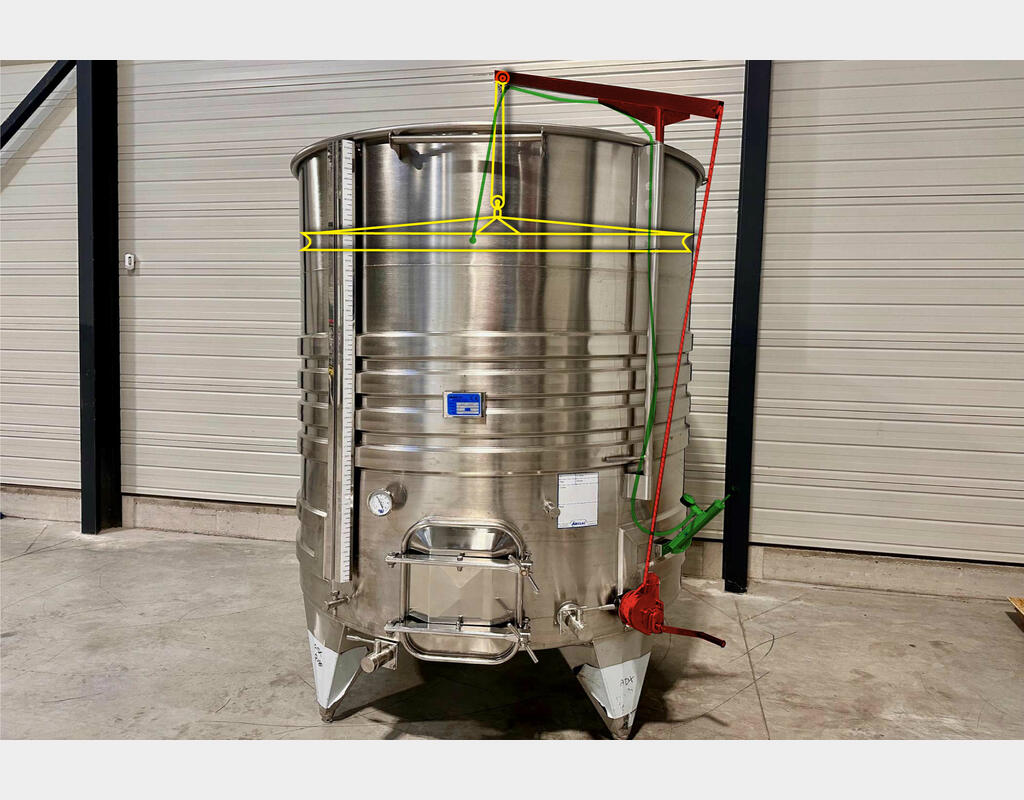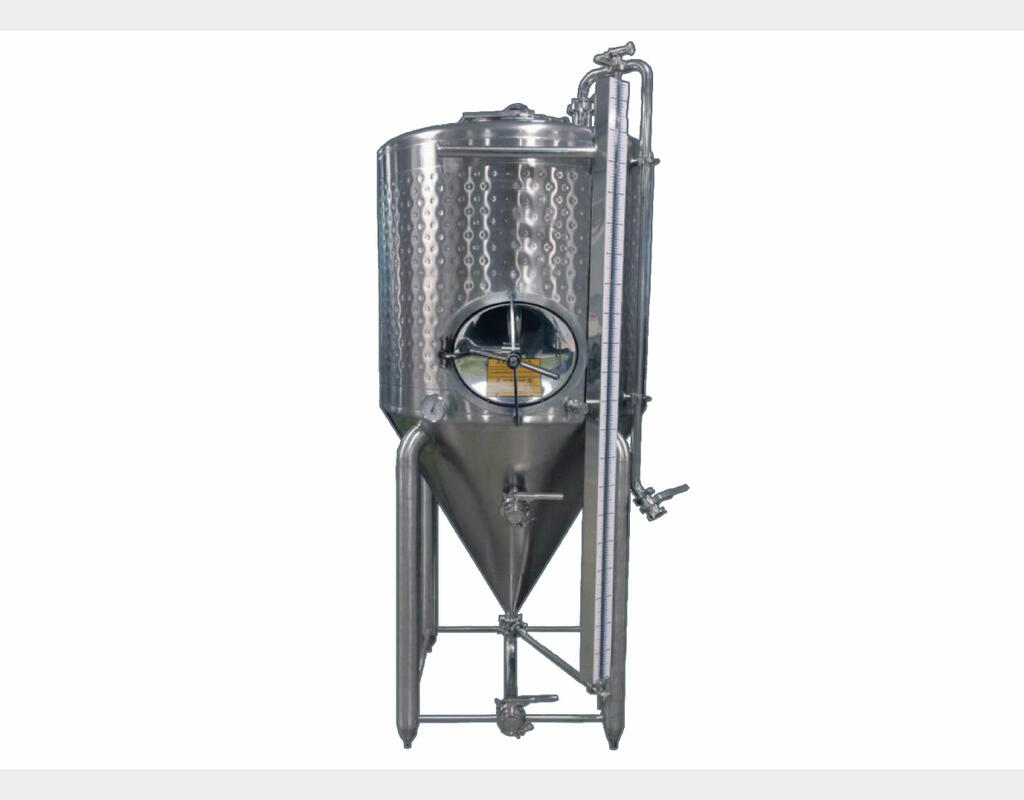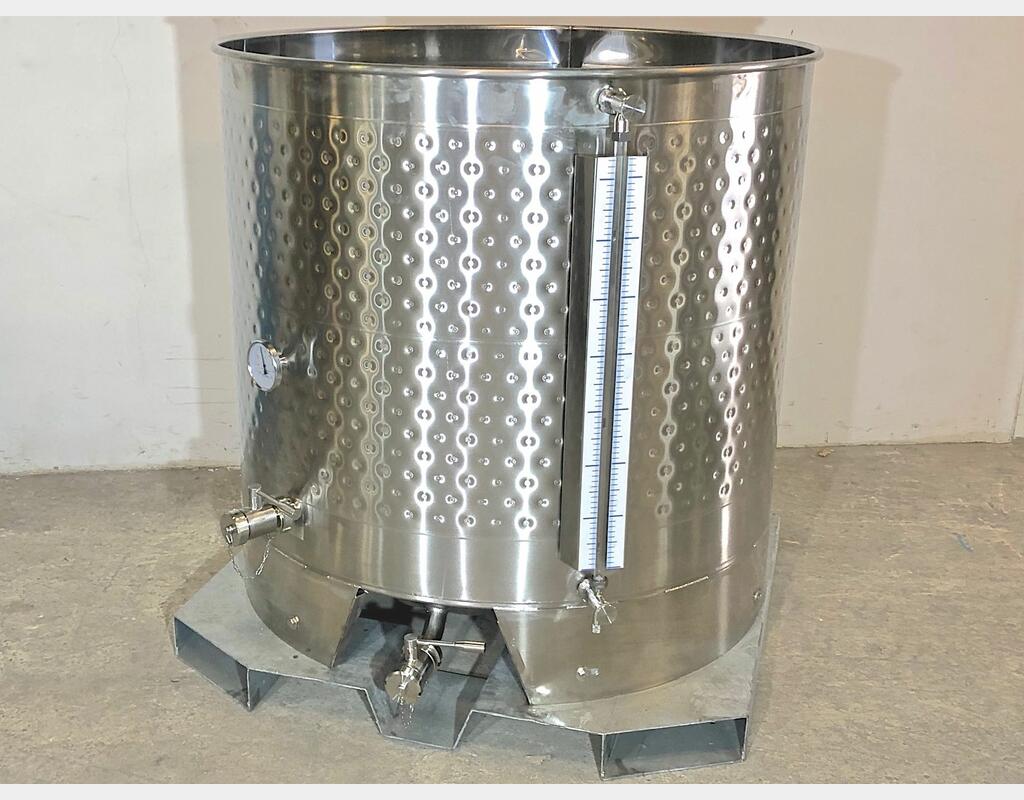Stainless steel IBC container tanks — secure storage and transfer
Benefits of liquid product management in industry
In today's industrial world, effective liquid management is a crucial issue affecting sectors as diverse as agri-food, chemicals, pharmaceuticals and many others. At the heart of this management is one essential element: storage and transport tanks. Among the options available on the market, stainless steel IBC tanks stand out as a solution of choice for meeting the complex needs of liquid handling, storage, and transport. Their growing popularity can be explained by a set of technical characteristics and benefits that make them a leading tool in modern supply chains.
💡 A design adapted to the constraints of industrial installations
Concrete advantages of stainless steel IBC tanks
- Guaranteed hygiene : smooth stainless steel walls and finishes adapted to cleaning protocols in place (CIP/SIP).
- Durability : high resistance to corrosion and chemicals, for increased longevity of installations.
- Enhanced productivity : optimised emptying, easier handling (stacking, fork access, lifting rings).
- Regulatory compliance : food contact compatibility, documentation and material certificates available.
- Versatility : suitable for food fluids, solvents, cosmetic and pharmaceutical solutions.
- Investment optimisation : choice between new equipment or reconditioned tanks that have been inspected.
Technical specifications of stainless steel IBC tanks for optimal industrial storage
Stainless steel IBC tanks are made from AISI 304 stainless steel, a material known for its corrosion resistance, durability, and compatibility with a wide variety of liquids, whether food or chemical. Their construction uses state-of-the-art technologies, including TIG welding with inert gas protection, ensuring exceptional strength and optimal sealing. The precision of the welding, enhanced by the use of pulsed arc and servo motors, ensures a flawless finish and increased mechanical strength. The weld is fine, precise and creates a solid joint that guarantees the structural integrity of the tank. The welds are mechanically cleaned after assembly to obtain a smooth surface, free of roughness or imperfections, thus reducing the risk of contamination and facilitating cleaning.
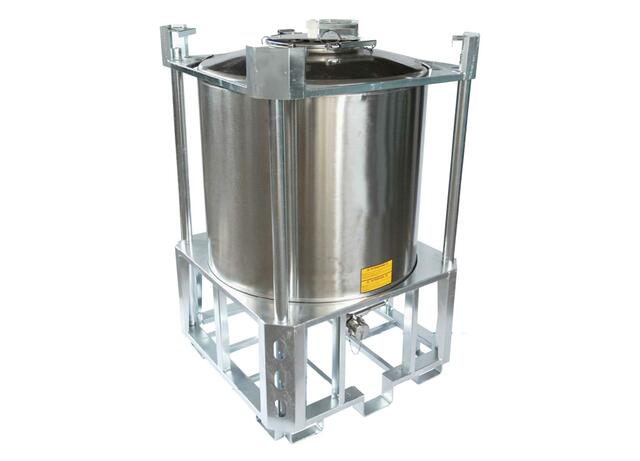
Advantages of AISI 304 stainless steel in industrial applications
The main material used in the manufacture of IBC tanks is AISI 304 stainless steel. This alloy is composed mainly of iron, chromium (approximately 18 per cent), and nickel (approximately 8 per cent), which gives it excellent corrosion and oxidation resistance properties. This makes the tanks extremely durable, even when exposed to aggressive chemicals, temperature variations, or humid environments. AISI 304 stainless steel is also non-reactive, meaning that it does not interact with most liquids, thus preserving their purity and preventing any alteration in taste, odour, or quality.
Ergonomics and safety : efficient handling and transport with stainless steel IBC tanks
Each IBC tank is housed in a protective cage made of galvanised steel, or stainless steel on request. This cage acts as a reinforced structure around the tank to protect it from shocks, impacts and mechanical stress during handling or transport. The galvanisation of the cage provides additional protection against corrosion, which is particularly important when tanks are exposed to the elements or corrosive environments. The cage design also secures the tank while making it stackable, maximising storage space in warehouses or transport trucks.
The base of the tank is palletised, meaning it is designed to be compatible with standard handling equipment such as forklifts, pallet trucks and cranes. The fork slots on each side of the base allow for quick and easy handling, whether moving, loading or unloading the tanks. This feature makes the tanks extremely practical and versatile, suitable for all industrial environments.
Stainless steel IBC tanks are equipped with large diameter hatches (usually 400 mm) with quick-release lever closures to allow easy access to the inside of the tank for filling, cleaning or inspection. They also have PVC valves designed to provide ventilation or pressure control, depending on the application requirements.
For draining liquids, the tanks are equipped with ball or butterfly drain valves (maximum size DN 50 or 2 inches). These valves ensure precise flow control when discharging liquids, and their design is optimised for complete drainage, thanks to moulded, sloped tank bottoms that prevent stagnant residues.
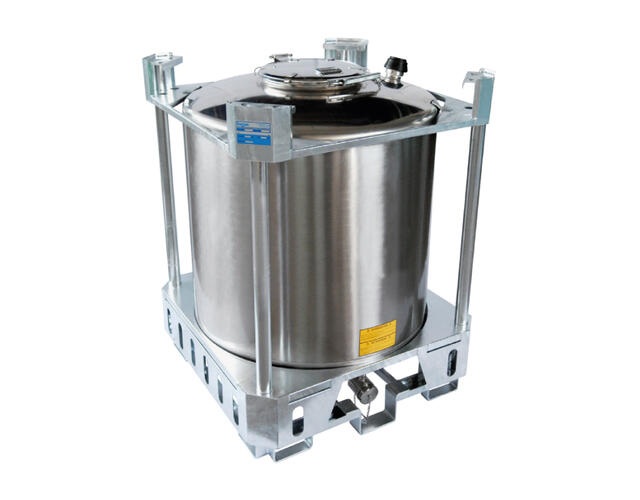
Regulatory compliance and safety standards for the secure transport of liquids
Stainless steel IBC tanks comply with the most stringent international regulations concerning the transport of dangerous goods. They are certified by the UN, ADR, and IRD for ‘intermediate bulk containers’ (IBCs). These certifications ensure that the tanks have passed rigorous strength and safety tests, guaranteeing safe use during road, rail, or sea transport. To ensure optimal tank longevity and avoid any risk of damage during transport, special attention is paid to the connection between the protective cage and the inner tank. The use of rubber buffers between the tank and the cage absorbs shocks and vibrations, while eliminating the risk of galvanic corrosion that could result from direct interaction between different types of metals.
Specific applications of stainless steel IBC tanks in the food, chemical and pharmaceutical industries
The shape and design of IBC tanks are designed to allow complete drainage of the liquids they contain. The tank bottoms are cold-pressed to create a natural slope that facilitates the flow of liquids towards the drain valve, minimising product loss and ensuring easy cleaning. This also ensures that the tank does not retain any stagnant liquid, avoiding any risk of contamination or deterioration of the stored products. In the food industry, these tanks are ideal for storing and transporting sensitive products such as wine, cider, or distillates. Their stainless steel design ensures maximum hygiene while preserving product quality. In the chemical and pharmaceutical industries, the robustness of stainless steel IBC tanks guarantees compatibility with a wide range of products, while ensuring compliance with the safety and quality standards specific to these sectors.
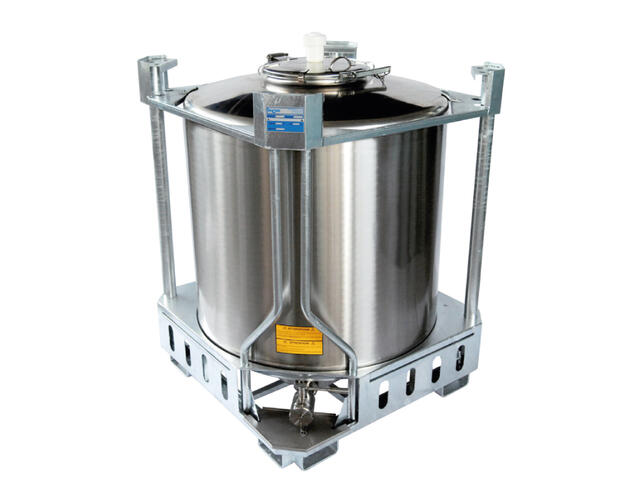
Stainless steel IBC tanks : an environmentally friendly and reusable solution for optimal efficiency
Stainless steel IBC tanks are a first-choice solution for any company seeking to optimise its liquid transport, storage and handling operations. Their durability, regulatory compliance and ease of handling make them a cost-effective and safe investment for meeting the logistical challenges of modern industries.
Technical specifications and available options :
- Standard capacities : 300 L to 1000 L (other volumes available on request).
- Materials : 304L stainless steel for general applications, 316L stainless steel for corrosive environments.
- Bottom : flat or sloped for complete drainage.
- Accessories : valves, connections, covers, gauges, relief valves, instrumentation.
- Handling : fork pockets, stackability, lifting rings depending on configuration.
- Documentation : plans, certificates, technical data sheets and compliance documents available.
✖ Doubts about the feasibility of your project ?
Please do not hesitate to contact an Arsilac representative if you have any questions or would like more information about stainless steel IBC tanks. Find the storage or transport solution that best meets your needs.
FAQ on stainless steel IBC tanks
Q : Why choose stainless steel IBC tanks for storing and transporting liquids ?
A : AISI 304 stainless steel IBC tanks offer high corrosion resistance, compatibility with a wide variety of liquids (food, chemical, pharmaceutical), and increased durability. They are designed for safe and efficient handling, while complying with international transport standards.
Q : What advantages does AISI 304 stainless steel offer over other materials ?
A : AISI 304 is known for its resistance to corrosion and oxidation, its durability, and its non-reactivity with most liquids. Unlike materials such as plastic, it does not contaminate stored liquids, thus preserving their purity and quality.
Q : How do stainless steel IBC tanks ensure safety when transporting hazardous liquids ?
A : Stainless steel IBC tanks are certified by international standards (UN, ADR, IRD), guaranteeing increased safety for the transport of dangerous goods. Their robust design, coupled with a protective cage made of galvanised or stainless steel, absorbs shocks and vibrations during transport.
Q : What is the added value of stainless steel IBC tanks for sectors such as agri-food, chemicals and pharmaceuticals ?
A : In the food industry, these tanks guarantee optimal hygiene and preserve the quality of sensitive liquids. For the chemical and pharmaceutical industries, they offer compatibility with various products and increased safety, complying with the strict quality standards of these sectors.
Q : Are stainless steel IBC tanks a profitable investment for a company ?
A : Yes, despite a potentially higher initial cost than other materials, the durability, ease of cleaning, reusability, and regulatory compliance of stainless steel IBC tanks make them a cost-effective investment in the long term. They also contribute to improved logistical efficiency and reduced costs associated with frequent damage or replacement.
In conclusion, used water tanks offer a practical and environmentally friendly solution for water collection and storage. Their durability, corrosion resistance and versatility make them an attractive choice for a wide range of applications. By considering the advantages and factors to take into account when purchasing and installing, you can take full advantage of the benefits of stainless steel tanks to meet your water needs.
#stainlesssteeltanks #industry #ibc #agri-food #chemistry #pharmacy #storage #transport #ibcstainlesssteeltanks
_
Note : This article is for informational purposes only and does not constitute professional advice. It is recommended that you consult with experts and comply with the specific regulations of each industry.


